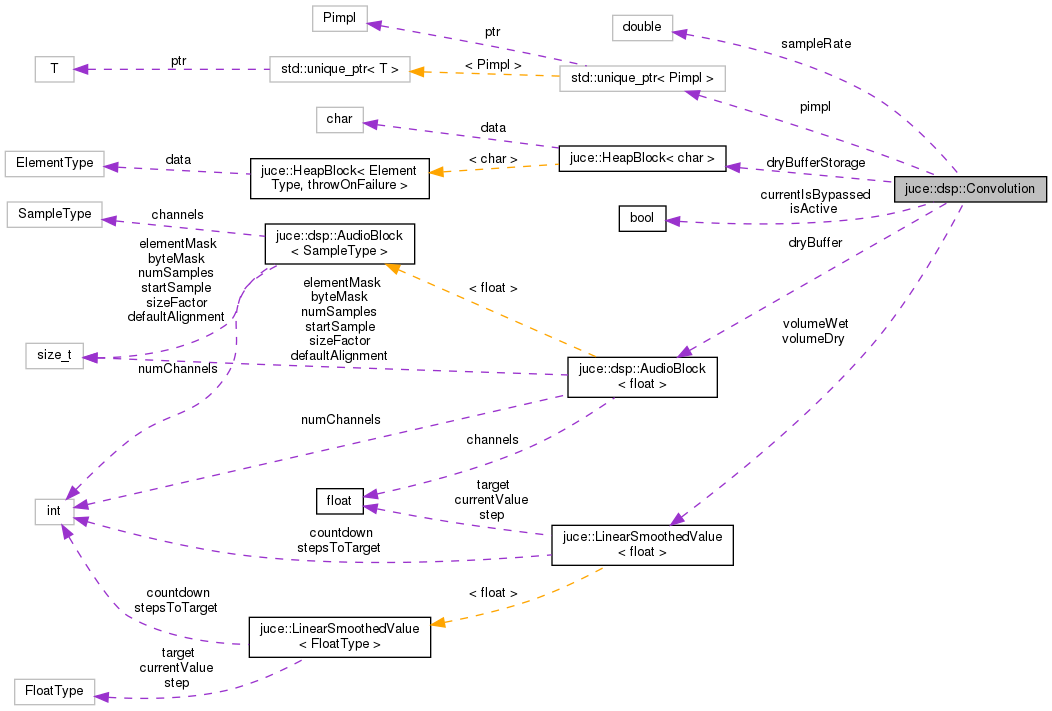Performs stereo uniform-partitioned convolution of an input signal with an impulse response in the frequency domain, using the juce FFT class.
More...
|
| | Convolution () |
| | Initialises an object for performing convolution in the frequency domain. More...
|
| |
| | ~Convolution () |
| | Destructor. More...
|
| |
| void | copyAndLoadImpulseResponseFromBlock (AudioBlock< float > block, double bufferSampleRate, bool wantsStereo, bool wantsTrimming, bool wantsNormalization, size_t size) |
| | This function loads an impulse response from an audio block, which is copied before doing anything else. More...
|
| |
| void | copyAndLoadImpulseResponseFromBuffer (AudioBuffer< float > &buffer, double bufferSampleRate, bool wantsStereo, bool wantsTrimming, bool wantsNormalization, size_t size) |
| | This function loads an impulse response from an audio buffer, which is copied before doing anything else. More...
|
| |
| void | loadImpulseResponse (const void *sourceData, size_t sourceDataSize, bool wantsStereo, bool wantsTrimming, size_t size, bool wantsNormalization=true) |
| | This function loads an impulse response audio file from memory, added in a JUCE project with the Projucer as binary data. More...
|
| |
| void | loadImpulseResponse (const File &fileImpulseResponse, bool wantsStereo, bool wantsTrimming, size_t size, bool wantsNormalization=true) |
| | This function loads an impulse response from an audio file on any drive. More...
|
| |
| void | prepare (const ProcessSpec &) |
| | Must be called before loading any impulse response, to provide to the convolution the maximumBufferSize to handle, and the sample rate useful for optional resampling. More...
|
| |
| template<typename ProcessContext > |
| void | process (const ProcessContext &context) noexcept |
| | Performs the filter operation on the given set of samples, with optional stereo processing. More...
|
| |
| void | reset () noexcept |
| | Resets the processing pipeline, ready to start a new stream of data. More...
|
| |
Performs stereo uniform-partitioned convolution of an input signal with an impulse response in the frequency domain, using the juce FFT class.
It provides some thread-safe functions to load impulse responses as well, from audio files or memory on the fly without any noticeable artefacts, performing resampling and trimming if necessary.
The processing is equivalent to the time domain convolution done in the class FIRFilter, with a FIRFilter::Coefficients object having as coefficients the samples of the impulse response. However, it is more efficient in general to do frequency domain convolution when the size of the impulse response is higher than 64 samples.
- See also
- FIRFilter, FIRFilter::Coefficients, FFT
{DSP}
| void juce::dsp::Convolution::loadImpulseResponse |
( |
const void * |
sourceData, |
|
|
size_t |
sourceDataSize, |
|
|
bool |
wantsStereo, |
|
|
bool |
wantsTrimming, |
|
|
size_t |
size, |
|
|
bool |
wantsNormalization = true |
|
) |
| |
This function loads an impulse response audio file from memory, added in a JUCE project with the Projucer as binary data.
It can load any of the audio formats registered in JUCE, and performs some resampling and pre-processing as well if needed.
Note: Obviously, don't try to use this function on float samples, since the data is supposed to be an audio file in its binary format, and be sure that the original data is not going to move at all its memory location during the process !!
- Parameters
-
| sourceData | the block of data to use as the stream's source |
| sourceDataSize | the number of bytes in the source data block |
| wantsStereo | requests to process both stereo channels or only one mono channel |
| wantsTrimming | requests to trim the start and the end of the impulse response |
| size | the expected size for the impulse response after loading, can be set to 0 for requesting maximum original impulse response size |
| wantsNormalization | requests to normalize the impulse response amplitude |
